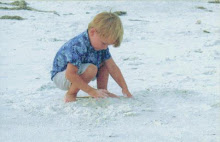I was pleased with this book, much more so than I thought I would be. I wasn’t sure what to expect from a children’s nutrition book written by a physician because most physicians are severely lacking in their understanding of good nutrition, and there is lots of nutrition misinformation out there. It was refreshing, however, to read a book by a physician that actually has a decent understanding of nutrition.
This book should be required reading for all parents, school administrators, physicians, etc. The nutritional concepts in the book are very basic and easy to understand, but still nutritionally sound. To me, the information seems so common sense, but I realize for many parents, this book could be an eye opener for them or a very first interaction in thinking about their child’s nutrition. NDD stands for Nutrition Deficit Disorder, in which the author maintains is what many of the children with ADD, allergies, and asthma, etc. are actually suffering from.
The state of health of our nation’s children is alarming. It is estimated this could be the first generation that may actually not outlive their parents. Diseases that were once thought of as only adult diseases are showing up in children at alarming rates. Children should not be obese or have diabetes. Mainstream wisdom usually lacks a connection between disease and nutrition, but what we eat is, in my opinion, the main contributing factor in health. The saying “we are what we eat” is actually very true for a number of reasons. It’s simple really. Give the body what it needs to function correctly such as vitamins and proper nutrients, and the body will actually function correctly.
There were many points about this book that I enjoyed. The book starts out with some alarming statistics: 1 in 3 children will eventually get diabetes, the number of preschoolers now receiving mood altering drugs has tripled, the number of Ritalin prescriptions for 2-4 year olds has tripled, obesity severe enough to disable a child has increased 40%. There are many more. These are terrifying. Clearly, it’s the way we are living. This book sets out to show the relationship between food and good health, and I feel it does a superb job at doing so.
The author discusses which foods are bad, and more importantly, why they are bad and the relationship between bad foods and bad health. The author also explains which foods are good and how they help the body function correctly. There is some technical explanation as to how bad foods put a body out of balance, but it is written in such a way that everyone can understand.
The book is also filled with recipes and loads of ways to make eating healthy food fun for kids.
The only criticism I have of this book is the fact that tofu is mentioned numerous times as a healthy food that children should be fed. Most hard core health experts recognize the fact that tofu is, in fact, simply more processed crap. There are lots of problems with processed soy such as tofu, and as a vegetarian, I still wouldn’t touch that stuff. I was a little disappointed tofu was toted as a health food by the book. I also would have liked to see more discussion on alternative diets for children, such as vegetarianism, but none were addressed.
For the most part, this book is nutritionally sound and congruent with the many other books on nutrition I have read. I appreciate the acknowledgment that children should be fed regular healthy foods, not “kid foods”, and I hope this book will make an impact on the future health of our children.
About Us

- TheHolisticParent.ORG
- Welcome to The Holistic Parent Book Reviews. We are avid readers of anything parent or health related. There are tons of books out there. Unfortunately, the most excellent books worth reading cannot be found at the local library. It's easy to spend great deals of money on books the library does not carry, only to be disappointed when the book comes and was not what you were expecting. We hope that by giving our opinions on various books we read, it will help others to decide whether a book is worth the time or money. Our blog is run in conjunction with our website www.theholisticparent.org, and much of our information on our website is also supported by books we review here. Happy Reading!
Tuesday, March 2, 2010
Subscribe to:
Post Comments (Atom)













No comments:
Post a Comment